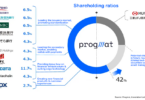Yesterday Follett Higher Education, one of the largest college campus retailers with more than 1,100 physical stores, announced a partnership with Greenlight Credentials. Greenlight provides blockchain-based verifiable credentials for student academic records.
In the U.S., the records of all the courses attended and grades earned are referred to as a college transcript. Greenlight gives control of those transcripts to the student in an electronic format so they can choose with whom to share them. It helps high school students applying to colleges and college graduates looking for their first jobs. Using a combination of blockchain and decentralized identity, colleges or potential employers can verify the validity of the academic records.
“Our model grants students the ability to safely and securely build a lifelong educational record that supports their academic and career goals,” said Manoj Kutty, CEO of GreenLight Credentials. “This partnership will reduce administrative burdens for schools and level the playing field for students, and we’re excited to partner with a mission-driven company like Follett Higher Education to equip students with the tools they need to thrive academically and beyond.”
The college retailer operates Follett ACCESS which includes all course materials as part of tuition charges so that students all the textbooks and coursware they need on the first day of the term. Greenlight Credentials will be offered with many of the access programs.
Follett is also taking an equity stake in Greenlight Credentials.
The Velocity Network for career credentials
Greenlight uses the Velocity Network, a blockchain network for career credentials that numerous service providers, colleges and recruiters use. It was founded by 15 organizations, such as SAP and the National Student Clearing House. Members include recruitment firm Randstad and Aon Assessment Solutions.
In order to enable interoperability, there are some standard credentials that issuers are incentivized to use. However, it also supports customized add-ons.
Only the students store their private information, with nothing personal saved on the blockchain. However, issuers write an encrypted proof of the credential to the blockchain so it can later be verified.
At a more technical level, Velocity uses Microsoft’s ION decentralized identity framework, and its blockchain is based on Hyperledger Besu.






